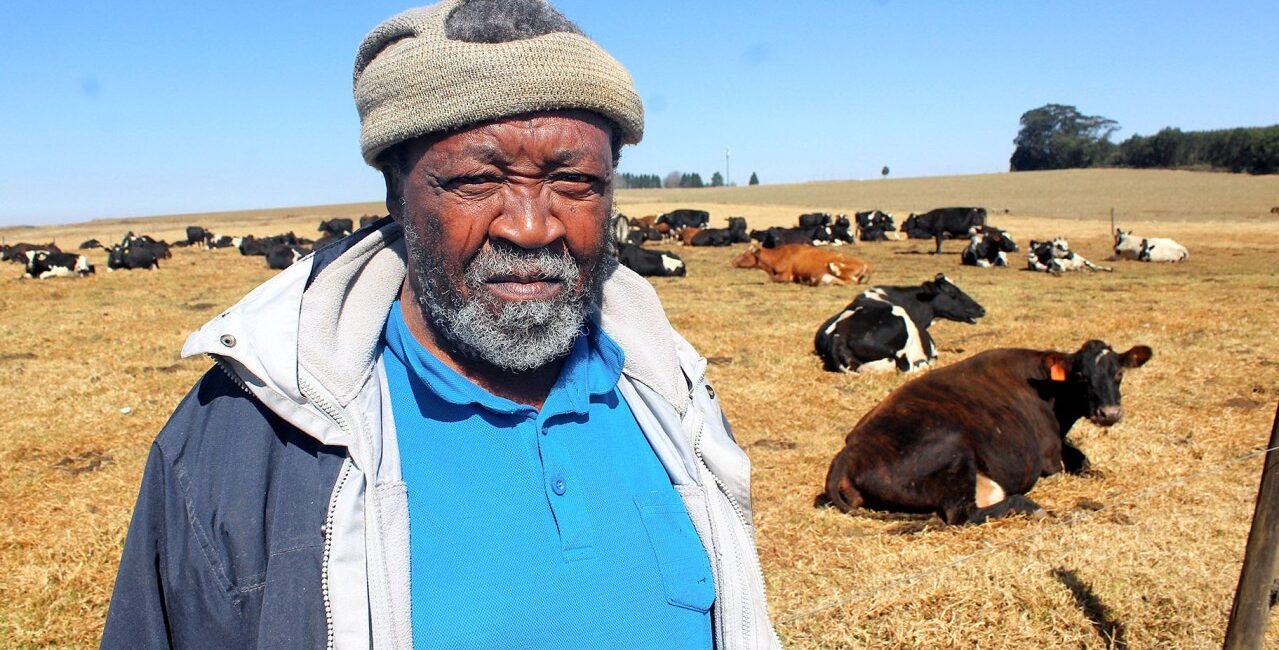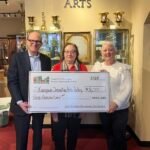Gugulomuzi Ducky Ngcobo, 71, grew up in Donnybrook, near Ixopo in KwaZulu-Natal. He says he had a tough father who taught him everything he knows about farming.
His father worked as a farmhand but Ngcobo moved away from farming as a young man. He secretly took driving lessons and began working as a forklift driver, saving 80% of his salary.
After more than a decade of saving, he purchased a taxi and slowly grew in the taxi industry. Eventually, he saved enough money to purchase Summerhill Farm when it came on the market in 2002. That farm started with six cows, and now Ngcobo has 300 cows and a state-of-the-art milking facility.
Ngcobo says of his childhood: “We would get lashings, not like the youth today. Now they will get you arrested.”
He holds his father in high regard and says if he were ever to rename his farm, which has kept its name from its previous owners, he would name it after his father, Myalwa Ngcobo.
Ngcobo didn’t have a specific type of farming in mind when he bought Sunninghill. He credits the farm’s growth to his long-time mentor and now friend Robert Stapylton-Smith, who advised him to go into the dairy industry and would sometimes give him a few cows to grow his herd.
Stapylton-Smith is a commercial dairy farmer from Eastwolds, Donnybrook, and a director of Stapylton-Smith Farming CC, Baynesfield Estate and the SA Large Herds Conference.
Stapylton-Smith says he admires how Ngcobo was always ready to grab an opportunity.
“When he has to get equipment, he had the funds saved to buy it. All the suggestions I made, he was ready to make the purchases – everything cash,” says Stapylton-Smith.
Standing on the Sunninghill Farm, Stapylton-Smith jokes that Ngcobo bought bags of physical cash to buy the property.
‘Great work ethic’
He says Ngcobo is tough and “is very responsible with money, even when he began. It was easy to work with him because he has a great work ethic and a natural entrepreneurial spirit. We also have known each other for a long time, since we were young men.
“I would never work for him though, he is very tough,” Stapylton-Smith adds, laughing.
Stapylton-Smith couldn’t wrap his mind around how Ngcobo was milking the cows in a rudimentary shed when he first started out, so they worked on a proposal to build the milking system.
With his business know-how and admin team behind him, Stapylton-Smith put all the necessary documents together and then discussed them with Ngcobo, who would sign off on the proposals.
The pair put together a proposal to the Agri-business Development Agency (ADA) in 2015, which helped develop the farm by providing funds to build a dam and later build a milking mill. The agency is a state-owned entity created by the KwaZulu-Natal government to support emerging black farmers and agribusiness entrepreneurs.
Funds from the agency, which came to R11-million, helped the farm provide animal feed, build bulk water supply grazing camps, and construct a 20-point herringbone dairy parlour, electrical and plumbing works, purchase milking equipment and construct stock handling facilities and access road infrastructure.

Gugulomuzi Ducky Ngcobo (left) and Rob Stapylton-Smith have a great respect for each other as farmers, which Stapylton-Smith credits for their successful mentorship relationship. (Photo: Tony Carnie)
Ngcobo says some of these improvements helped cut his work processes by hours. Before, milking would take the whole morning. Now it takes no more than two hours.
“The dam that supplies water helped me so much because we had to walk so far to find water for the cows, and sometimes we wouldn’t find water there and had to go further,” said Ngcobo
This resulted in days sometimes ending at 9pm. Now they end at 5pm.
Stapylton-Smith also commends current eThekwini Municipality Mayor Cyril Xaba, who previously served as KZN MEC for agriculture and rural development, for the help he offered Ngcobo.
‘Something you love’
When asked what he would say to a farmer who is starting small with dreams of going commercial, Ngcobo says farming must come from the heart.
“I can’t motivate you. What matters is what is in your heart. This has to be something you love. You have to ask yourself what you want. Farming is hard. A farm is heavy and hard. It can look easy from afar, but when you get close you will see the hard work.”
Stapylton-Smith adds that Ngcobo’s father was a great farmer who instilled his lessons.
When asked what he thinks about the government’s failed land redistribution programme, Ngcobo says: “I have heard stories of farms that didn’t work, and I think what makes it hard is there are a lot of people involved, so it’s hard to get a group to have the same vision and move as one. There will be too many ideas – you need to go to bed thinking about your goals for the next day.”
Paying it forward
Stapylton-Smith continues to mentor a group of commercial farmers in Ixopo and surrounding areas. They have formed a non-profit organisation, Harry Gwala Agri, where they run programmes such as internships for Technical Vocational Education and Training college students, guiding young small-scale farmers and working with willing farmers who have received land through restitution claims.
He says the non-profit organisation is a vehicle through which to redress the wrongs of the past by creating sustainable, successful business development strategies and offering support to previously disadvantaged people.
After more than two decades of farming, Ngcobo says he is always learning as there are many challenges in running his farm. He recently lost cows due to a white cell sickness, and now needs a bigger supply of water as his herd grows.
“The farm is challenging. It’s very up and down. Maybe it takes a lot of years to feel like you are balanced, so now I am making plans to expand the water source to supply the growing herd.” DM
![]()




No Comment! Be the first one.